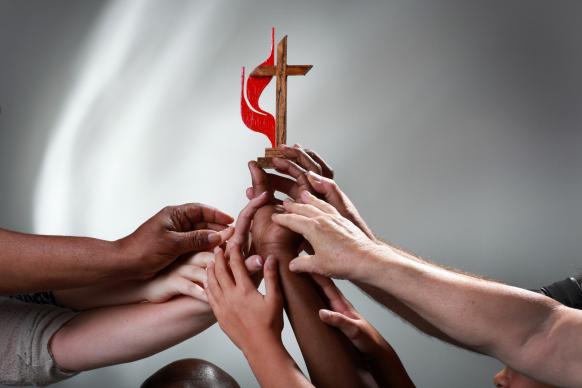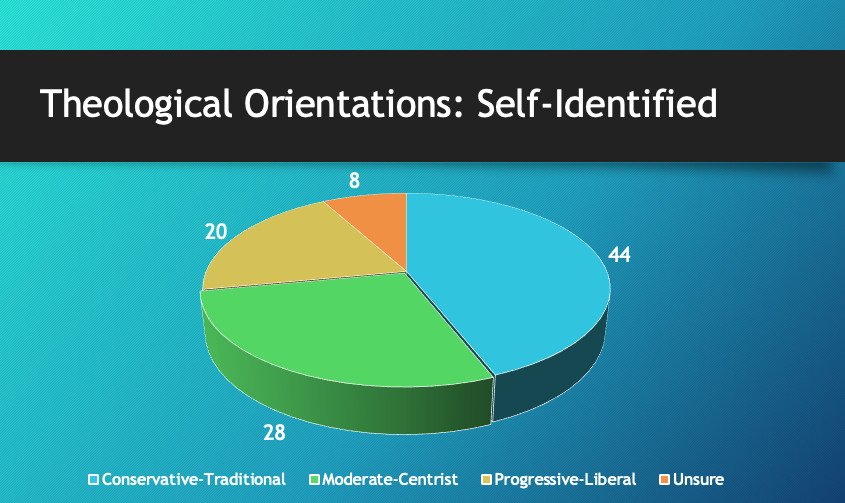
As we prepare for the Special Session of the UMC’s General Conference, February 23-26, in St. Louis, Mo., UM News Service has been publishing an abundance of news and feature articles and commentaries to offer information and interpretation about this potentially momentous, challenging, global gathering.
We offer some recent articles here and will selectively vet and add more as they become available. We invite anyone in our conference to send us articles they think may be helpful to our readers’ understanding and also to send us their views. We will also create this week a special social media hashtag to welcome and share your comments and ours. Stay tuned.

What do United Methodists really believe?
The United Methodist Church is a big tent theologically, and people with conservative or traditional religious beliefs make up the largest group under that spreading canvas.
Those are two key findings from a new United Methodist Communications survey of United Methodists in the United States. The survey dug into views on various theology-related subjects, including the Bible, Jesus, salvation, the Resurrection and the afterlife. The goal was to shed light on the beliefs of people in the pews of United Methodist churches. Learn more…
General Conference is happening. What can I do?
On Feb.23, elected United Methodist delegates along with our bishops will gather in St. Louis, Missouri, for a called special session of General Conference. The goal of the meeting is to find a way forward through our disagreements about same-sex marriage and ordination of LGBTQ clergy.
You may feel far removed from what is happening in St. Louis, but there are ways we can follow what’s happening and support those doing the work. One should start with prayer for all involved and then seek information remain open-minded and open-hearted about the difference in views, Learn more…
United Methodist trust clause: Critical amid struggle?
John Wesley was good at predicting the future. There have been numerous times over the past century when Methodist congregations decided they no longer wanted to be part of this denomination but wanted to keep all the church property.
That’s something John Wesley thought about in 1750 when he asked lawyers to craft deeds for three Methodist preaching houses in England. Later, Francis Asbury and Thomas Coke got the 1796 General Conference to approve the trust clause that is still in effect today. It states the local church owns the property in trust for the entire denomination; and it has been upheld by a number of courts over the years. Learn more…
LGBTQ United Methodists are hurting — and leaving
UM News Service spoke to former United Methodist clergy and lay people who left the church because of frustration over treatment of LGBTQ people. They voiced their profound disappointment and pain over having to leave a denomination and local churches they loved, and they mourned also the church’s loss of what they had to offer. Learn more…
Also read “Former members on why they left”
The plan of ‘gracious inclusion’
MADISON, N.J. (UMNS) — The Simple Plan would relieve The United Methodist Church of the burdens of discrimination and the responsibility of enforcement by punishment, writes the Rev. Althea Spencer Miller, a Drew University Theological School professor.
Read commentary
On the authority of Scripture
DAYTON, Ohio — “Apart from Scripture and tradition, we cannot know who Jesus is,” writes the Rev. David F. Watson, academic dean and associate professor of New Testament at United Theological Seminary, on the subject of scriptural authority. “It is part of the tradition of the church that we understand Scripture as a canon, and to say that Scripture is our primary canon means that it is authoritative in a way that other sources are not.” Read commentary
Lessons from other denominational divides
The United Methodist Church is not the first Christian body to deal with the potentially church-splintering debate over homosexuality and biblical interpretation. As United Methodists prepare for the special General Conference on Feb. 23-26, they might learn from the experiences of their ecumenical partners, U.S. Episcopalians, Lutherans and Presbyterians. All have dealt with their own divides over the roles of LGBTQ Christians.
Chief among those lessons: All are still standing and doing ministry — and so are the new denominations that have struck out on their own. However, no denominational divorce is easy. Learn more…
